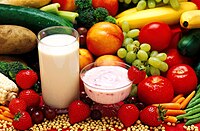
Photo from wikipedia
Current evidence reveals that not only the quantities but also the types of dietary protein have important implications in renal disease. The aim of this study was to investigate the… Click to show full abstract
Current evidence reveals that not only the quantities but also the types of dietary protein have important implications in renal disease. The aim of this study was to investigate the effects of lacto-ovo vegetarian and omnivorous diets on renal function and nutritional status in Taiwanese patients with stage 3 to 5 chronic kidney disease (CKD). This is a cross-sectional study. Outpatients with stage 3 to 5 CKD, who visited the Department of Nephrology and Nutrition at Chung Shan Medical University Hospital between June 2011 and May 2015 were enrolled. Subjects were divided into the lacto-ovo vegetarian group and omnivorous group based on dietary protein patterns. The indicators of renal function included estimated glomerular filtration rate (eGFR), creatinine, and blood urea nitrogen (BUN). Albumin, hemoglobin (Hb), and red blood cell count (RBC) measurements served as nutritional indicators. The levels of dietary energy and protein, as well as protein sources (plant or animal), were also analyzed. A total of 100 outpatients with stage 3 to 5 CKD were enrolled in this study, including 40 lacto-ovo vegetarians and 60 omnivores. The results showed that the levels of serum phosphate and triglycerides were significantly lower in the lacto-ovo vegetarian group than those in the omnivorous group. However, there were no significant differences in the renal function indices or nutritional status between the two study groups.
Journal Title: Journal of Food and Nutrition Research
Year Published: 2017
Link to full text (if available)
Share on Social Media: Sign Up to like & get
recommendations!